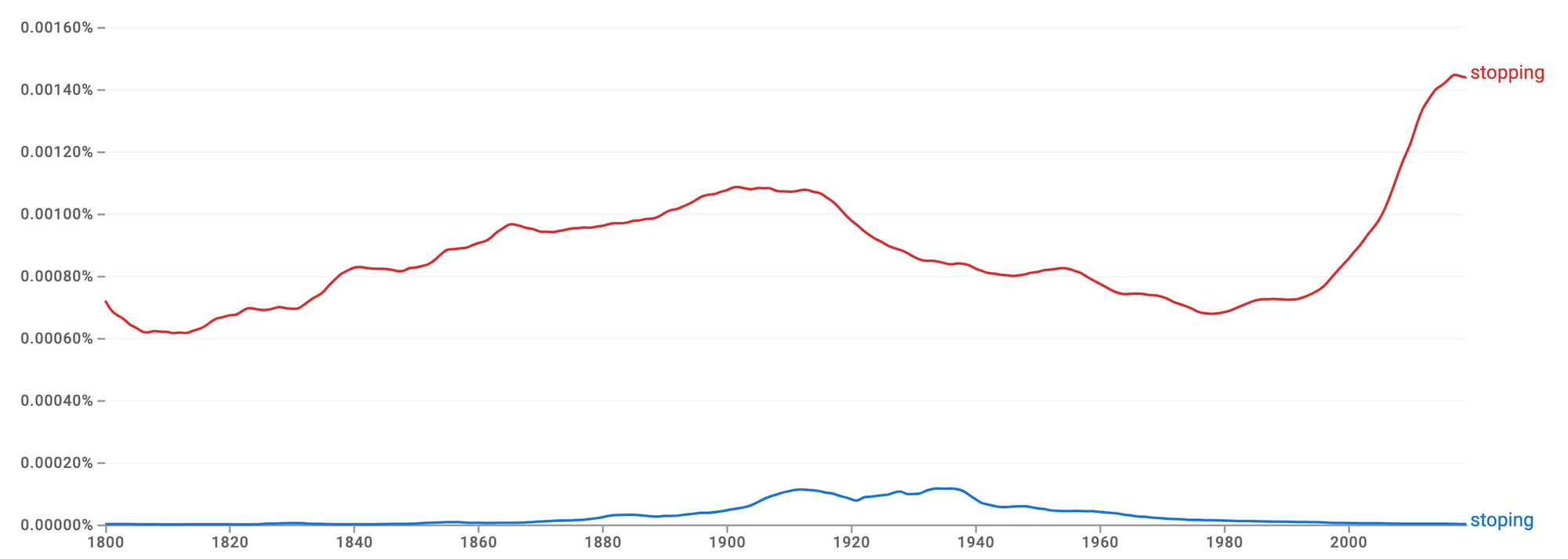- "Stoping" is an incorrect spelling of the word "stopping."
- "Stopping" is the gerund form of the verb "stop," indicating the action of coming to a halt or ceasing movement.

❌ After a long run, Sarah considered stoping to catch her breath.
✅ After a long run, Sarah considered stopping to catch her breath.
In this sentence, "stopping" refers to the act of ceasing the action of running.
What does "stopping" mean?
Stopping refers to the act of bringing something to a halt, ending its progress, or preventing it from continuing. It encompasses a wide range of situations and can be applied to physical movement, actions, processes, thoughts, feelings, or events.
Here are key aspects of stopping:
Cessation of Motion or Action:
- Involves bringing a physical object or activity to a standstill.
- Examples: A car stopping at a red light, a person stopping to rest during a hike, a machine stopping due to a malfunction.
Interruption of a Process or Event:
- Refers to halting a sequence of actions or a series of events.
- Examples: Stopping a meeting due to a fire alarm, stopping a conversation to answer a phone call, stopping a software program from running.
Prevention of Continuation:
- Involves taking steps to ensure something doesn't proceed further.
- Examples: Stopping a child from running into the street, stopping a rumor from spreading, stopping a disease from progressing.


The use of "stoping" and "stopping" over time
The Ngram graph below shows how often "stoping" and "stopping" have been used from the 1800s to the 2000s. "Stopping" has fluctuated in use before peaking in the 2000s, while its misspelling "distroy" has always seen nearly zero use.

How to pronounce "stopping"
In British English, "stopping" is pronounced like "sto·puhng".
In American English, "stopping" is pronounced like "staa·puhng".
This is just the standard pronunciation, and there may be slight variations depending on regional accents and individual speech patterns.
Why would we misspell "stopping" as "stoping"?
- Typo: "Stoping" is essentially "stopping" with a missing "p", which could happen due to accidentally skipping the second "p," especially when typing quickly or not focusing closely on the spelling.
- False analogy: Some individuals might incorrectly associate "stoping" with words like "hoping" or "roping," where a single "p" is used. This false connection could lead them to believe that "stoping" is the correct spelling, based on the analogy with other words.
Other common misspellings of "stopping"
- stoping
- stoppin
- stoping
- stoppong
- stoping
Example sentences of the misspelling of "stopping" as "stoping"
- It's important to note that 'stoping' is a common misspelling, and the correct form is 'stopping.'
- Many writers inadvertently use 'misspelling' instead of the correct term 'stopping' in their texts.
- Be cautious not to fall into the trap of using 'misspelling' when referring to the act of coming to a halt; the proper term is 'stopping.'
- Avoid the error of substituting 'misspelling' for 'stopping' when expressing the cessation of an action.
- Remember, 'misspelling' is an error, and the accurate term for the action of stopping is 'stopping.'
Example sentences of "stopping"
- The traffic light turned red, signaling the need for the cars to start stopping.
- Every hour during the journey, the bus made a brief stopping to allow passengers to stretch their legs.
- The teacher emphasized the importance of correctly stopping at the end of each sentence when reading aloud.
- After a sudden noise, the rabbit hesitated, cautiously stopping in its tracks.
- In emergencies, knowing the proper technique for quickly stopping a vehicle can be crucial.
- The rhythmic stopping and starting of the raindrops on the roof created a soothing sound.
- The marathon runner practiced controlled breathing while stopping briefly at water stations.
- The conductor announced that the train would be stopping at the next station for a short break.
- The automatic doors slid open, and the elevator came to a smooth stopping on the ground floor.
- During the dance performance, the dancers executed a series of graceful stopping motions.
🖊️ Breaking vs. Braking
🖊️ Shiping vs. Shipping: Which Is Correct?
Synonyms for "stopping"
- Halting
- Ceasing
- Pausing
- Discontinuing
- Terminating

Want to sound like a native speaker?
Engram’s AI-powered grammar checker makes your English sound like a native speaker’s, suggesting natural English expressions on top of fixing grammar, spelling, punctuation, word order, and vocabulary.

References:















